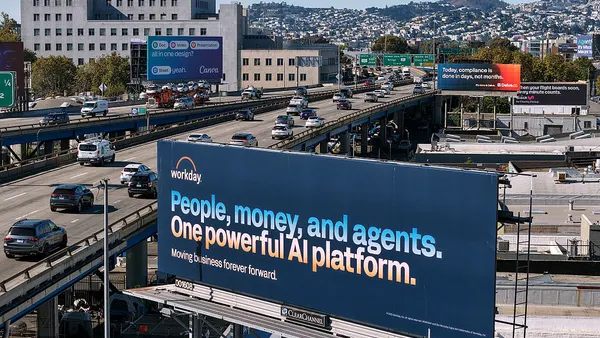We asked for your insights on mentorship, and you delivered.
After you read our piece on "grandparenting," take a look at the insights real-world HR practitioners (all of them HR Dive readers) had to say about millennials, mentorship programs, and the nature of cross-generational communication. We'll be adding more as time goes on.
“What employees and leaders alike need is someone who can truly frientor™ them. It's about more than giving someone the political scoop on a company or ensuring access to the right tools and historical information.
It's about having their back - telling them when they're stepping out of line or having too much to drink at the office holiday party or telling them when they were too hard on someone in a meeting. It's about ensuring professional AND personal development.
We can read about and do analyses of emotional intelligence until the cows come home. If we don't have people to help us in real time, our development will be limited.”
— Claudia Williams, President, The Human Zone LLC
“As Gen Z – the new kid on the block who is significantly larger than their predecessors — will make up almost 40% of the workplace by 2020. Given that they think very much like Gen X — who for the most part raised them — like-minded Gen Z and Gen X collectively will make up the majority of the workforce and thus will greatly influence the workplace mindset. So, if Millennials like those noted in the NY Times article believe that they will “take over”, they may be in for a bit of a shock in the next five years.
I think what is needed — beyond mentorship — is a collective understanding of multi-generational preferences in the workplace. One generation catering to another or one generation making demands upon another isn’t going to bring harmony into the workplace and thus will create a very unhealthy corporate culture.
I believe only a holistic, and diverse, approach to creating a culture of wellbeing can bring about lasting and meaningful change.”
— Pamela Shadrick, Strategic Account Planner, Marketing Strategy, ITA Group
“The first meeting was set to become acquainted and to set ground rules for setting and achieving goals. My background and skill set was reviewed, and a discussion was held about several career paths which would be attainable, and which of those best matched my passions.
Subsequent meetings were to give me assignments designed to give me visibility, to provide matrix engagement, to provide guided (and editorial) development, and to identify areas needing process improvement in my department. Of course, the first agenda item was a status report on prior assignments.
Unfortunately, a mentorship can backfire if your manager does not want to commit to the time and budget process required to improve processes, or if they feel threatened by someone having ideas that they should have had. Sometimes it is far too easy for a manager to maintain the status quo, and have turnover, rather than think about root causes being systemic in nature.”
— Philip A. Eccles, MHA, CLSS, explaining his mentorship experience
"We recently started a mentorship program with what we call our 'rising stars'. Each of our 'senior' management group works closely and is responsible for grooming his/her replacement. The idea is not to replace a person. The idea is to ensure we have a back-up person who can take on the job responsibilities on a moments notice.
This ensures knowledge is being past down to the next generation, it engages the person down the line, and it encourages participation on both parts."
—Irma Fernandez, Staff Development & Training, Cole Hardware
"Mentoring can be very critical if done right. It isn’t a single prescription that can be applied to all as many HR programs are designed to do. It has to be tailored to match the mentee, the mentor, the context of the workplace issues/needs, and the overarching goals of the organization.
Sometimes that has looked like private lecturing or storytelling by the mentor (often not the solution) and other times it looks like executive coaching sessions with a real application/results component to it. That style needs to be modified depending on whether there is leadership development/training available in the organization or not. If not, mentoring takes an even more critical priority because the “training” occurs within that context.
That disconnect between needing mentoring programs to prepare millennials for leadership and not providing mentoring programs as you note in your study may be more a misnomer or a lack of formality – but the failure to prepare is real."
—Cheryl Swingle, Vice President, Managing Consultant, Lee Hecht Harrison










